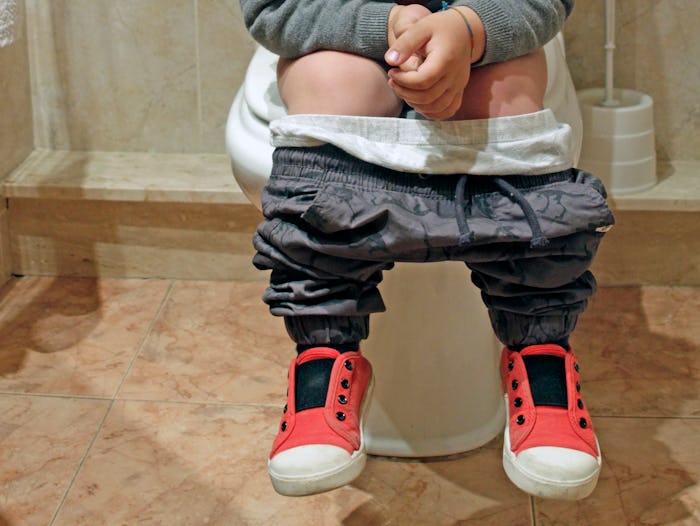Life

Here's What You Need To Know About Peppermint Oil Helping Constipation
As a mom, I receive plenty of advice on the perils of child-rearing on a daily basis. At this point, I feel like I've heard it all — and that includes the trick that a drop of peppermint oil in the toilet can help a kid poop.
Until recently, I had no idea that anyone did this, but apparently it is an actual thing people do. And not just for their kids, either. Anecdotes that this method works for some people can be found on various blogs and in posts across social media. But does it work? Is it even safe?
"Anecdotal evidence is not enough to substantiate a remedy’s claim to fame. Peppermint essential oil has been used for a long time to soothe and relax muscles, topically, and even for digestive purposes," New York based gastroenterologist Dr. Niket Sonpal tells Romper. "If you were to put the drops inside the toilet, the only thing that would cause your body to react would be the menthol of the essential oil which, under this theory, could cause a reaction that loosens up your muscles and relaxes with the hope of promoting a bowel movement."
Citing evidence from multiple scientific studies on the use of peppermint oil in integrative medicine, National Association for Holistic Aromatherapy (NAHA) President Annette Davis tells Romper, “Peppermint is a very useful essential oil which is commonly used in integrative medicine to help manage irritable bowel syndrome and functional constipation.”
Davis notes that although peppermint oil is commonly used for management of IBS symptoms, the toilet bowl method specifically has not been studied. “There is no scientific evidence, however, that placing drops of peppermint into the toilet bowl is effective," Davis says. "If it does work, it is likely due to peppermint's antispasmodic properties.”
Peppermint oil is generally touted as safe, with studies in medical journals such as American Family Physician and even general information on the National Institute of Health's website stating the effectiveness of using peppermint oil to aid in digestion. However, its use can have negative consequences for young children, according to information provided by the NAHA, including the potential for "dizziness, confusion, muscle weakness, nausea and double vision" when large doses are inhaled.
"It should be noted that parents need to be careful about allowing peppermint oil to come into contact with the faces of infants and children," Davis tells Romper. If you are considering using peppermint oil around young children, it is advised that you read the NAHA's complete report on peppermint oil safety, as well as consult your child's physician.
Dr. Marc Levitt, M.D., colorectal and pelvic reconstructive surgeon at Children’s National Hospital, sees the most severe cases of pediatric constipation in his surgical practice. "Constipation is exceedingly common. It is the most common cause of abdominal pain in kids who go to the emergency room with this complaint," he tells Romper. "It also comprises one of every 10 pediatric office visits. Often a diet of laxative type foods does the trick. Occasionally a laxative is needed."
Although he notes that only the most severe cases will need surgical intervention, he recommends that, "If a child is having trouble pooping and this is causing pain, bloating, inability to eat, or soiling accidents, then a patient will need some medical help to solve these issues."
Obviously, the fear that severe constipation could end in a surgical visit can lead parents to take extreme measures when it comes to attempting to resolve their child's struggles themselves.
If you're hesitant to try the peppermint in the toilet bowl trick with your kids, it's understandable, but should you try the toilet bowl method for yourself? "The effectiveness of this has not been studied enough to depend on peppermint oil in the toilet as a comprehensive remedy for constipation," Dr. Sonpal tells Romper.
If you're having trouble pooping, Dr. Sonpal says that increasing your water-soluble fiber consumption, staying hydrated, and reducing stress are great starting points for addressing occasional constipation, as well as over-the-counter stool softeners, laxatives, and enemas if problems persist. However, he does note that if your constipation lasts longer than a week to consult your doctor.
Choosing natural remedies like essential oils for medical issues can have serious consequences if precautions are not taken to ensure safety. Always consult a physician before attempting to utilize a home remedy that involves essential oils — especially with your kids — even if you're just putting peppermint oils in the toilet.
Studies Referenced:
Kligler B, Chaudhary S. (2007) Peppermint oil. American Family Physician. https://www.ncbi.nlm.nih.gov/pubmed/17427617
Alammar, N., Wang, L., Saberi, B., Nanavati, J., Holtmann, G., Shinohara, R. T., & Mullin, G. E. (2019, January 17). The impact of peppermint oil on the irritable bowel syndrome: a meta-analysis of the pooled clinical data. Retrieved from https://www.ncbi.nlm.nih.gov/pmc/articles/PMC6337770/
Dai, L., Zhong, L. L., & Ji, G. (2019, November 6). Irritable bowel syndrome and functional constipation management with integrative medicine: A systematic review. Retrieved from https://www.ncbi.nlm.nih.gov/pubmed/31750331
Cappello, G., Spezzaferro, M., Grossi, L., Manzoli, L., & Marzio, L. (2007, June). Peppermint oil (Mintoil) in the treatment of irritable bowel syndrome: a prospective double blind placebo-controlled randomized trial. Retrieved from https://www.ncbi.nlm.nih.gov/pubmed/17420159
Experts:
Marc Levitt, M.D., colorectal and pelvic reconstructive surgeon at Children’s National Hospital
Dr. Niket Sonpal, New York Based Internist and Gastroenterologist and Adjunct Professor at Touro College
Annette Davis, National Association for Holistic Aromatherapy President
This article was originally published on